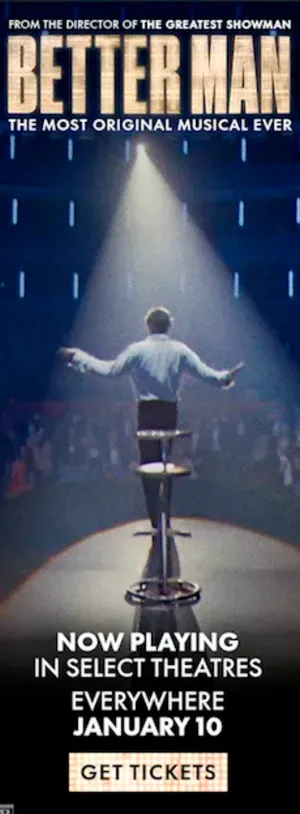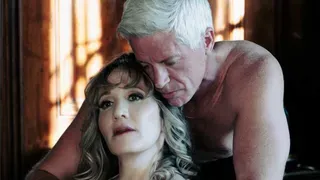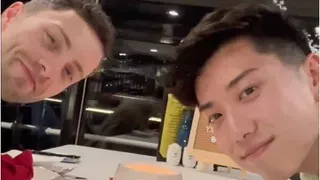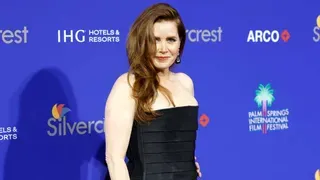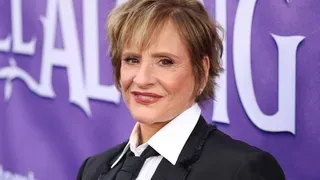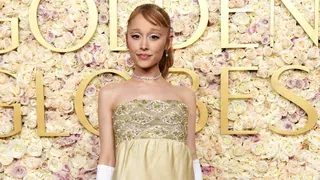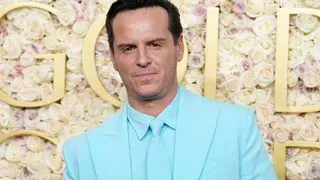January 3, 2024
EDGE Interview: Andrew Haigh Looks at the Past Through a Queer Lens in 'All of Us Strangers'
Frank J. Avella READ TIME: 14 MIN.
Out Brit filmmaker Andrew Haigh has crafted an exquisite, melancholic, lyrical meditation on love, death, family and memory, anchored by a truly arresting performance by Andrew Scott. "All of Us Strangers," loosely and queerly adapted by Haigh from the Japanese novel "Strangers" by Taichi Yamada, centers on Adam (Andrew Scott, in a rich, nuanced performance deserving awards attention), a frustrated screenwriter who lives in a virtually empty high-rise, outside London. The only other apparent tenant is a mysterious boozy younger man named Harry ( Paul Mescal, crazy-sexy), who hits on Adam and the two eventually hook up. Meanwhile Adam reconnects with his long dead parents (Jamie Bell & Claire Foy, both flawless) who are, once again, living in his childhood home in the suburbs. Oh, and both are the same age as when they perished in an auto accident when Adam was 12, meaning they're both significantly younger than their son. But this is no gimmicky supernatural thriller, although it can be viewed as a ghost story of sorts. Haigh has more ambitious aspirations that delve into identity, desire, grief, regret, abandonment, fear, loneliness and forgiveness. Not too heady!
And the film is told through the autobio-Haigh-lens which is unapologetically queer.
Haigh is no stranger to telling gay stories, both obvious and peripheral. In 2009 he made his first feature, "Greek Pete," which followed a London rent boy around for a year. His breakout hit, "Weekend," released in 2011, chronicled a 48-hour gay romance and is already considered an LGBTQ classic. The film starred Tom Cullen and Chris New.
"45 Years" followed in 2015, dissecting a marriage in crisis. Charlotte Rampling received her first Oscar nomination for her role opposite Tom Courtenay.
The quietly bold HBO series, "Looking" premiered in 2014. The cast included Jonathan Groff, Murray J. Bartlett, Frankie J. Alvarez and Russell Tovey. "Looking" presented an authentic peek at a gaggle of gay friends in modern-day San Francisco. The show only lasted 2 seasons but was given a movie-length wrap episode in 2016.
The highly underrated indie, "Lean on Pete," (2017) took a current but, also, prescient look at the ethical and moral divide in the U.S. Haigh also kept the enigmatic lead character's sexual orientation cryptic. And as played by the gifted Charlie Plummer, that ambiguity had a decidedly queer lean.
"The North Water," a 2021 miniseries based on the novel by Ian McGuire and created by Haigh, had its share of homoerotic scenes between leads Colin Farrell and Jack O'Connell.
"All of Us Strangers" is Haigh's most personal queer exploration. It's also his most haunting, mesmerizing and best film to date.
EDGE had the pleasure of a zoom chat with Haigh.
EDGE: Andrew, the relatability to so much of this film for me was so deep and almost profound. I've spoken to quite a few people queer and not queer, who feel the same. So, through specificity you've achieved universality.
Andrew Haigh: That's very nice. That's always kind of what your goal is. Nobody wants to see a story that is just about something very specific--that has nothing else to say. That doesn't work. You have to always ground it in something universal bubbling underneath. That's what I was trying to do. It's so nice that it does work for people and works for different types of people. That's important. I didn't want to make it just for one group of people, so I'm really pleased about that.
EDGE: Can you speak about taking the Yamada novel and making it your own?
Andrew Haigh: Yeah, so the central idea is the same. I love that central idea of meeting your parents again, it felt like it unlocked something in me, and it unlock this idea about being able to talk about your past and what the past has done to you and how it can be hard to leave it behind. I don't just mean in terms of grief. I mean, in terms of how we felt when we were young and childhood experience...
This idea that we are so formulated by the first 10, 15 years of our lives and we can never really escape that. I see that in everybody. I see in people who are 70... your childhood has defined you who you are as an adult. It's almost impossible to escape it. And so that felt like such an opportunity to be able to tell that story within this strange sort of ghost story, metaphysical love story, whatever you want to see this as.
EDGE: You're reminding me, Jane Fonda said when she was writing her autobiography that she needed to go back to examine in order to move forward. I feel like the older we get, the more we seem to look back.
Andrew Haigh: I'm 50 now and I feel like the last 10 years, I've really felt it. I think when you're young, you don't look back, obviously, there's nothing to look back on. But as you get older, you're like, Okay, I've got however many years I've got left, I need to go back, I need to recalibrate, I need to have a reunion with my own path, so I can understand why I am the way I am. So, it makes total sense to me. But you have to stare it in the face. And you have to throw yourself into it in order to find some kind of way to move forward. I think that's why the film does resonate because I feel like we all want that. And the idea that we could actually have a world in which you could physically meet your past, again, is quite powerful.
EDGE: This is like a 1980s question, but we keep boomeranging, don't we? Did you get any pushback wanting to tell a queer specific and Andrew Haigh-specific story?
Andrew Haigh: I'm Yeah, that's interesting because that's two different things, isn't it? I like that. When the producers came to me with the book, the minute I said I want to do this, but I have to make it queer, they were like, of course great, do it and make the story you want to make. And Searchlight and Film4 were the same--they were l excited by the idea that I had made it specifically queer. There was no pushback... And then specific for me, is again, something different. And I feel like luckily, I've been making films now for long enough that people understand what that film will be. And they wanted to support that. So, it felt good.
EDGE: How did you decide on the structure and tone of the film?
Andrew Haigh: That was probably the biggest struggle. I did a lot of versions of the script... to fill in the structure, which there is a sort of logic but then I throw myself away from the logic. There's lots of things that I'm trying to do at the same time. And in many ways, I wanted just to plot it emotionally. If all this is a manifestation of Adam's need, what does that mean for the plot?... What does that make the tone of the film feel? And especially when you're dealing with something that could be seen as ghosts, there's so much weird logic that gets put onto those stories. Can they eat? What happens to them when he's not there? Is he really in the house?... At one point during the writing, I was like, I've got to free myself from the eternal, endless questions that you can ask yourself about the plot, and just make it be a film about feeling and texture and emotion and let that drive it.
EDGE: Speaking to that, I was fascinated by the quiet moments, the details, the lingering close ups, I've seen a few films lately, where there was all that minutia, and I was just fucking bored. Here, I was never not mesmerized.
Andrew Haigh: That's nice, because it's so true, there's no point, putting the camera on someone's face if they're not giving you something that is interesting. It just doesn't work. It's pointless... like someone standing by the window, looking out to show that they're lonely only works if something's happening or you're feeling something. For me, it is about that fine tuning and calibrating in the edit, so you're not bored and you're giving the audience something new each time or something surprising or there's something underneath what you're giving... I feel like I've always been trying to find that in everything I do. It's finding that space for the character just to exist and for you to lean in and listen more and concentrate more. I feel like if you can do that you're enveloping the audience into the story and into the world. And if you do it right then it can work.
EDGE: And, of course, your cast assemblage helps because you get such authentic and deeply affecting performances from your actors, whether it's Tom and Chris, or Charlotte and Tom or Charlie Plummer. And Andrew, Paul, Claire and Jamie here. Can you tell me a little bit about your selection process?
Andrew Haigh: The selection process is always the thing that I spent so long thinking about it. If you get that wrong, it's not going to work. And it's all about trying to find people that make sense together. That's how I how I do it. And also trying to find the right kind of people, not just as actors, but as basic human beings. I spend a lot of time reading interviews that actors might have given, watching clips of them when they're being interviewed. And then I have to sit down with them and talk to them before I go forward. I want to know what it is that they care about in terms of the material. I want to know if they're going to be open enough as collaborators to share their own experience, and me share my experience, of life and relationships and family and all that kind of thing. Then if you can get that, I think you just develop a trust. And they know I'm not going to screw them over... I love that process. I love working with actors. I love letting them be what they want to be as much as what I want them to be. That's the trick, you've got to just let it come out of them and don't try and force it into some preconceived notion of what you need that performance to be.
Frank J. Avella is a proud EDGE and Awards Daily contributor. He serves as the GALECA Industry Liaison and is a Member of the New York Film Critics Online. His award-winning short film, FIG JAM, has shown in Festivals worldwide (figjamfilm.com). Frank's screenplays have won numerous awards in 17 countries. Recently produced plays include LURED & VATICAL FALLS, both O'Neill semifinalists. He is currently working on a highly personal project, FROCI, about the queer Italian/Italian-American experience. He is a proud member of the Dramatists Guild. https://filmfreeway.com/FrankAvella https://muckrack.com/fjaklute
